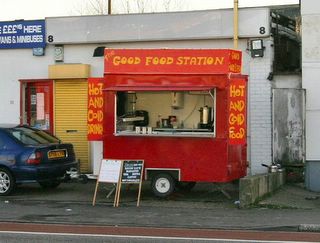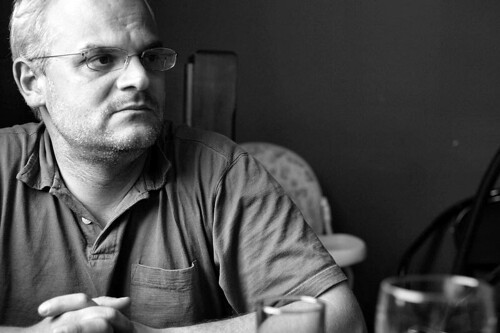.
Lately, I've been toying with ideas for making my blog an altogether more hip and trendy kind of place to be.
.
The latest scheme is to start writing it in Polari.
.
For anyone reading this blog who doesn’t know, Polari is a form of slang that was popular in London, particularly Soho, in the 1950's and 1960's. Its roots stretch further back, right through to the start of the century and maybe before.
.
Polari is a mixture of Italian / Yiddish / Polish / Romany / Backslang / Rhyming Slang and was most commonly used between homosexuals who didn't want to be overheard by the police; back in the days when such things were totally illegal.
.
As such, Polari would have been a strong contender for the much-coveted, annual 'Language least likely to be spoken by members of the KKK' award 1948-1968. If such an award had ever existed.
.
Actually, Polari was not just used to conceal homosexual banter from police. It was also a handy way of broadcasting one's sexuality. For example, if you found yourself in a social group that included someone who would regularly cry out 'Bona!' or refer to last night's 'Trade', you could be pretty certain that he was gay as a coot and plan the rest of your evening accordingly.
.
Polari glossaries are available on the web and many Polari words have crept into common use. Personal favourites include:
.
Trade = sex
Trolling = walking (esp. looking for trade)
Bona = good
Cod = bad
Nada = nothing
Chicken = Young Man
Palaver = Argument
Ponce = Pimp
Cottage = public lavatory
Shyckle = Wig
Vada = See
Mince = walk effeminately
Drag = clothes / to dress
Scarper = run away
Naff = not very good (Normal as F*ck / Not available for F*cking)
Bijou = Small
.
So, an expression such as 'I went trolling around Dilly, dragged-up like a ponce, trying to vada some bona trade and all I could find was a naff chicken who didn’t fancy a spot of cottaging' is actually quite rude.
.
There are many, many more Polari words out there, most of them of Italian extraction, but they have fallen out of use and sound fake and affected to modern ears.
.
Connoisseurs of such dated entertainment as The Carry On Movies, anything featuring Kenneth Williams, Porridge, Minder and Jamie Oliver cookery programmes will be on familiar ground here.
.
Polari died out in the 1970's, partly because homosexuality was made legal, partly because London ethnic demographics changed and partly because it sounded too Queeny, even for the London gay scene. The odd word is still occasionally used in gay circles, bona and fantabulosa come to mind, but usually in an ironic, jokey kind of way. Some Polari was still in use in the London theatre scene when I worked in the West End as a teen in the late 1970's early 1980's.
.
Polari reached the peak of its fame round about 1965 when it was used heavily in a popular radio show called Round the Horne. Round the Horne featured two astronomically camp characters called Julian and Sandy who would lisp away to each other in hardcore Polari.
.
This was back in the days when people still sat at home listening to the radio, dressed in a shirt and tie, smoking pipes, reading enormous newspapers and or doing the knitting. On a small table, next to the radio sat a brown teapot covered in a custom-made woollen jumper to keep the tea warm. Yet somehow, this most conservative of national audiences lapped-up Julian and Sandy's camp dialogue, not knowing for a second what they were talking about.
.
Quite strange.
.
If you listen to old tapes of Round the Horne, and there are many in circulation, particularly in Brighton, you can hear two layers of laughter from the studio audience. 90% of the laughter comes from people laughing at the funny men with silly voices. 10% of the laughter comes from people who understand what they are actually saying.
.
As a slight aside, I was chatting with Tracy a few nights ago about just how conservative Britain was in 1965 and the subject of the Michael Caine movie, The Ipcress File, came up.
.
There are some scenes in old movies that caused a big stir at the time but pass unnoticed to later audiences. The classic example is Clark Gable removing his shirt to reveal that he wasn't wearing a vest in It Happened One Night, 1934. Undershirt sales plummeted. TV's first inter-racial kiss in Star Trek also comes to mind. A similar example is Michael Caine's cooking scene in The Ipcress File. At one point in the film Caine demonstrates his New Man credentials by offering to cook his young lady 'the best meal she's ever eaten'. He then takes her back to his flat and makes her an omelette. After which they shag furiously like bunnies, just to prove that Caine isn’t in fact a woman. So challenging was the cooking scene to Caine that a stunt double had to be brought in for the close-up egg-cracking and frying shots.
.
An omelette! Yes, I can just see that working in 2005.
.
'You've made me an omelette'
'Yes'
'You said you were going to cook me the best meal I'd ever eaten! You've dragged me back to your flat halfway across London to cook me an omelette'
'Yes, and here it is'
'Twat'
.
Yes, Britain in 1965. The Britain I was born into. A Britain where no real man could crack an egg and little old ladies doing crochet would laugh at the camp goings on of two radio characters hinting at casual anal sex in public lavatories.
.
A strange time.
.
Anyway, Polari is ripe for a come back. The manager at Madame Jo Jo's night-club in Soho recently issued his staff with printed Polari glossaries as a bit of fun and other establishments may follow suit.
.
I might just join them.
.
Subscribe to:
Post Comments (Atom)




















1 comment:
Yes, when Ronnie Barker made Porridge he said that he need to make up a swear word for use in a prison sitcom, otherwise it wouldn't sound right to have dialogue with prisoners not swearing.
And so, the story goes, he created the word naff which 'doesn't mean anything at all'
Yeah right
Post a Comment